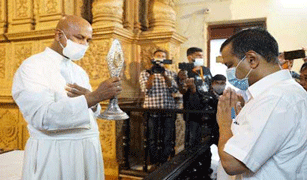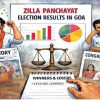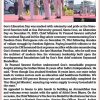Goa is abuzz with excitement as vintage bike and car owners, users, collectors and fans are decking […]

GOA SWING VOTE IS CATHOLIC! BY ARVIND PINTO
Elections, Oct 02- Oct 08, 2021 October 1, 2021RELIGION: Leaders of all political parties visit churches, temples and mosques during their election campaigns. Kejriwal on his visit to Goa recently went to the Bon Jesus Basilica which contains the relics of St Francis Xavier
By Arvind Pinto
With south Goa having a majority Catholic population, no political party can hope to find and form a government in Goa without the help of the minority Catholic community. The migrant Muslim community also plays a major role in the outcome of elections in Goa.
IN THE need to garner votes and win elections, political parties in India are unfortunately increasingly using religion as a means to achieve their nefarious ends. Unfortunately, in India which is still a developing country, religion plays a significant role in the lives of our people. While in the early years of the republic there was an attempt to keep religion away from political discourse, the emphasis being on economic progress and welfare; today, religion plays a subtle but decisive role in both Central and State elections.
While it would be difficult to pinpoint at what stage religion came to the fore as an important consideration in our electoral program, the destruction of the Babri Masjid was a watershed moment. After that happened religion has been unabashedly used to influence or sway a gullible electorate.
exploiting religion
Both the visual and print media is quick to focus attention on leading candidates making a beeline to the nearest temple, mosque, gurdwara or church! In fact, our political candidates feel blessed visiting holy men be they gurus, pandits, maulvis or priests. You cannot blame these men of God, since it is their moment in the sun, most of the time they are shuttered in their sanctuaries which are far from the limelight.
Why does religion play an important role in Indian politics? With the development and growth of economic prosperity, it was expected to be in line with the Marxist philosophy for religion to wither away. But as it has been seen from what was the citadel of Marxism, it was easier for the Soviet state to wither away than Orthodox Christianity from mainland Russia.
It was a similar case in China or even Vietnam. I had occasion to visit Vietnam last year and was amazed at the attendance to Sunday services in Hanoi or Saigon. Despite the attempts to sow atheism in these communist regimes, the Church was alive and kicking. Today with the lifting of restrictions, there is a spiritual revival. In India where religion is a way of life, its role is dominant, and its message powerful when it comes to promoting a party or a candidate.
This is why shrewd political strategies emphasize on the selection of a candidate in the context of the religious composition of the electorate. For it makes strategic sense to put up a candidate who has close connections with his constituency.
Thus, all parties in India play to the religious gallery and decide on candidates depending on the predominant religious color of the constituency. Further during elections, parties would like to be seen and photographed either worshipping at a prominent temple or gurudwara, a photo-op that they hope would go down well with the electorate. Religion has now become a strategy to color people’s perception with an eye on the hustings! Cynical but true, this is the game all politicians play.
kejriwal visits old goa
WITH elections coming up next year in Goa, an attempt is being made by several parties to reach out to the Goan electorate. The BJP in Goa was quick to realize that the Catholic vote was essential to their quest for power. It did not take the High Command long to win over pliable prominent Catholic politicians from other parties, especially from the Congress.
Thus, the BJP government in Goa has an equal number of ministers from both the Catholic and Hindu communities. Ironically, a majority of ministers were poached from the Congress party that was once the dominant party in Goa. Now the new entrants like Trinamool Congress from Bengal and the Aam Aadmi Party from Delhi, are seeking entry into Goa. They can only enter the political scene by poaching from another party and here again it is from the hapless Congress party.
We have seen recently how veteran Congressman Luizinho Faleiro resigned from his Assembly seat to join the Trinamol Congress. In fact, a few days earlier, a priest had addressed a letter to West Bengal Chief Minister Mamata Banerjee, cautioning her against recruiting “a dirty old man” (we now know who) into her party.
parish priests role
Well, in politics there are no friends or foes, and notwithstanding the priest’s letter, Luizinho Faleiro is all set to become the standard bearer of the Trinamool Congress in Goa! Politics in Goa has a party hopping pass time for its jaded politicians who hope to revive their fading fortunes. The electorate can only watch silently while politicians they voted into power jump from one party to another without one thought for their voters, much like tourists do on Goa beaches, moving from one beach to another and as many bars in the hope of catching up with the crowd!
Does religion play a significant role in Goan elections? The mainline parties use religion subtly in attempting to convey their message. The RSS has a strong cadre in Goa and will put its entire force at the doors of the party in power. Further, the recent legislative permissions granted to migrants have created a bucket of goodwill for the party in power. Inducements play an important part in campaigning and most veteran winners know the art of influencing people.
While Goa has a sizeable middle class that would not easily be swayed, this poorer migrant sections of the electorate are active in visiting polling booths for material gains. Besides, several Goan voters are outside Goa, and rarely make it a point of return to their home state to vote in the elections. As yet there is little sign of any major political activity, except for the spotlight being on promises made by leaders of AAP and the induction of Luizinho Faleiro into the Trinamol Congress. The battle lines of next year’s elections are still hazy. But religion and physical inducements will undoubtedly play a crucial role in who wins and who loses.















